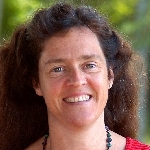 (Host)
(Host)
Commentator Susan Clark is town moderator of Middlesex, and she’s
written extensively about the tradition of Town Meeting. Recently, she
attended a training for moderators and couldn’t help but notice a change
in the people Vermonters are electing to lead their town meetings.
(Clark)
Vermonters have traditionally elected men to run their town meetings.
I’ve often joked that the best thing about the town moderator’s training
is that there’s never a line in the ladies’ room.
But
increasingly, women are being elected to town offices, and this year it
finally happened. We heard a presentation on some particularly gnarly
aspects of Robert’s Rules, we took a break, and there it was! Three
women ahead of me in line to powder our noses.
As I chatted with
my fellow female moderators, we pondered the new trend. First, kudos to
the women’s movement. In my mother’s day, women weren’t even allowed to
have their own checking accounts. Now we’re facilitating multi-million
dollar budget decisions.
It might also indicate that we’re
making decisions differently. As the field of dialogue and deliberation
has become established in recent years, scholars are proving what most
Vermont towns have known for centuries: moderators need more than rules
and a loud voice. And some of the skills needed are those that women are
especially good at.
Linguistical studies have shown that for
most women, verbal communication is primarily about relationships. A
good moderator listens carefully, to help people formulate their
thoughts into a motion and get their work done. And a moderator is a
good "storyteller" — to describe the decision-making and what voting
"aye" or "nay" means in each case. Robert’s Rules haven’t changed much,
but the way we apply them is nuanced, and a woman’s touch doesn’t hurt.
A
few years ago, I was in Glarus, Switzerland, at their open-air,
canton-wide meeting. Switzerland is the only other place besides New
England that holds town meetings. As the sun glinted off the
snow-covered peaks towering around the town square, I felt a thrill of
excitement when the assembly elected its first-ever female moderator in
its 700-year-history — a huge symbolic step for women.
But a
few days later, a dour Swiss bureaucrat burst my bubble. The reason the
Swiss were electing women moderators, he told me, is because power is
becoming more centralized. The work at the town and canton level is less
important. Essentially, in his view, local issues were becoming so
trivial that they were women’s work.
Ouch.
Sexism aside,
my bureaucratic friend is correct. The historical trend has been toward
centralized power. But I think this historical trend might be just that
– historical.
Ecological and economic realities are making it
clear that more citizen involvement – not less – will be needed to find
solutions. More and more, communities are creating energy committees,
public-private initiatives, and other creative local solutions to a
growing global mess. The pendulum is swinging back. As the movement
toward local food, local energy, and local economies grows in strength,
we will need a healthy, well-trained civic infrastructure to respond.
Vermont’s
town meeting tradition has trained us well. And our town moderators
will be prepared – noses metaphorically powdered, and ready for action.